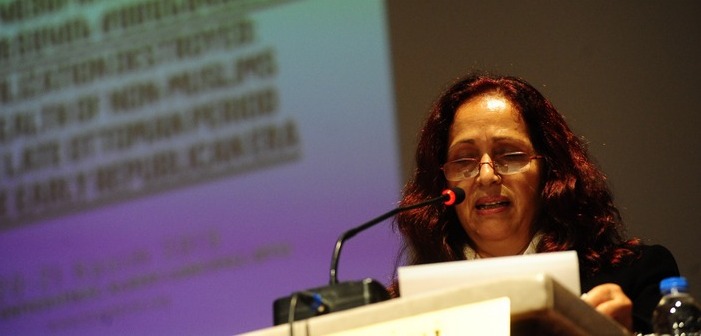Rakel Dink: Bugün de kadim kültürler yok edilmek isteniyor


Hrant Dink Vakfı, Sabancı Üniversitesi, Boğaziçi Üniversitesi ve Bilgi Üniversitesi tarafından düzenlenen ‘Yok Edilen Medeniyet: Geç Osmanlı ve Erken Cumhuriyet Dönemlerinde Gayrimüslim Varlığı’ konferansı başladı.
Konferansın açılış konuşmasını Rakel Dink yaptı.
2005 yılında düzenlenen konferansı hatırlatan Dink, şunları söyledi:
‘Onlar bugünün yolunu açtı’
Tam 10 yıl önce, 2005’te İstanbul’da, tarihe “Ermeni Konferansı” adıyla geçen “İmparatorluğun Son Döneminde Osmanlı Ermenileri: Bilimsel Sorumluluk ve Demokrasi' adlı konferans yapıldı. Türkiye’nin üç büyük üniversitesi Boğaziçi, Bilgi ve Sabancı üniversiteleri Türkiye demokrasi tarihinde önemli bir dönüm noktası sayılacak bu konferansın düzenleyici kurumları oldular.
Kolay olmadı. Kurumlar, dönemin rektörleri ve organizasyonda görev alanlar Türkiye’yi sırtından hançerlemeye varacak ithamlarla karşılaştılar. Bedeller ödendi. Ama onlar bugünün yolunu açtılar.
Bugün, o konferanstan 10 yıl sonra, Ermeni Soykırımı’nın 100. yılında yine bu üç üniversitenin işbirliğiyle buradayız. Akademik tartışmaların özgürlük alanlarını korumaktaki kararlı duruşları ve bu konferansın organizasyonuna verdikleri her türlü destek için Hrant Dink Vakfı adına, Boğaziçi, Bilgi ve Sabancı üniversitelerine ve katkı sunan tüm dostlara tek tek içten teşekkürlerimi sunuyorum.”
İki gün boyunca düzenlenecek olan konferansta, uluslaşma sürecinde uygulanan imha ve Türkleştirme politikaları ile tasfiye edilen Gayrimüslim varlığın tarihinin, yok olan beşeri sermaye, toplumsal ve ekonomik sonuçlarının tartışılmasını amaçladıklarını söyleyen Dink, konuşmasına şöyle devam etti,
‘Her gün ağıt yaksam azdır’
“Mal canın yongasıdır derler, doğrudur ama can olmadan da o mal ne işe yarar? Gelişip güzelleşebilir mi? Yaşadıklarımız bize bunu kanıtlıyor. İnsan kaynağını, zenaatkarını, yazarını, çizerini, okumuş aydınlarını kaybetmiş bir toplumda mal na kadar gelişir ve serpilir ki... Peki bunca insanın, canın yok oluşunun ardından malın ne önemi var denmez mi? Evet denir denmesine de acaba o medeniyetin, kültürün, zenginliğin ve varlığın el değiştirmesi planın son amacı değil mi?
Ben şahsen kavmimin kayıpları için her gün ağıt yaksam azdır. Bu hem Ermenilerin kaybı, hem insanlığın büyük kaybı. Farkındaysanız türkülerimizin yüzde 95’i ağıt gibidirler. Zabel Yesayan 1909’da Adana katliamından sonra yazdığı “Yıkıntılar Arasında” kitabında o cehennem günlerinde yaşananların karanlık ve gerçek derinliğini tam olarak kavramamızın imkansız olduğunu anlatır. Belki de en çok ağıtlarda yaklaşıyoruz o derinliğe. Artık türkülerde Adana’yı, Bingöl’ü, Van’ı gezebiliyor ve daha nerelerin güzelliklerinin özlemi ve yok edilmiş medeniyetin acısını yaşayabiliyor ve hissedebiliyoruz.
‘Gayrimüslim varlığından geri kalanları arıyorlar’
Hrant Dink Vakfı’nda 2 senedir bir grup genç Türkiye’deki gayrimüslim varlıktan geri kalanları arıyor, binlerce kilisenin, okulun, sinagoğun envanterini çıkarıyor, yok edilen bir medeniyetin izlerini sürüyor. En önemli kaynaklarının başında define avcılarının siteleri geliyor. Hrant’ın dediği gibi “Yerin altında Ermeni definesi arayanlar, yer üstündeki Ermeni definesinin ne kadar farkında oldular? Yaşanmışlıklar hiç de farkında olmadıklarını gösteriyor.”
Yüz yıl önce bereketli topraklar olan Anadolu bugün niçin çorak çöle dönüştü? İpek yolunun can damarı, medeniyetler beşiği güneydoğu bugün niçin üzerinde ot bitmez kervan geçmez hale geldi?
‘Unutma ve unutturma ki, bir daha yaşanmasın’
Peki bugün yaklaşık bir 100 yıl sonra ve etrafımızda bunca taze acı yaşanmaktayken, yüzbinlerce insan yine evlerinden yurtlarından edilmekte ve bizler masum bebelerin vahşice ölümlerine tanıklık ederken, medeniyetler çatışması başka bir şekilde alevlenmişken biz neden hala geçmişi konuşmakta ısrar ediyoruz? 100 yıl önce yok edilen bir medeniyeti konuşmayı neden bu kadar önemsiyoruz?
“Biz ülke olarak daha önce bizim dışımızda bu konularda yapılan tartışmaların dışında kalmış olabiliriz ama insanoğlu bu tartışmaları zamanında layıkıyla yaptı ve sonuçta da şu evrensel düsturu geliştirdi: ‘Unutma ve unutturma ki, bir daha yaşamayasın.’”
“Ve bugün hâlâ unutmayı savunanlar, aslında sadece geçmişten değil gelecekten korkanlardır. Unutulmamış geçmiş, geleceğin de teminatıdır.”
‘Bugün de kadim kültürler yok edilmek isteniyor’
Sözün özü; yüz yıl önce, hep birlikte yaşadığımız bu topraklarda, kadim bir medeniyet tarumar edildi... Bugün de kadim kültürler yok edilmek isteniyor.
Burada bulunmamızın amacı, doğru soruları sormak. Geçmişte olanları doğru aktarırsak ancak bugün olanları ve ardındaki gerçekleri tüm çıplaklığıyla görebiliriz, ve işte o zaman tüm bu kötülükleri engelleyebilir ve “bir daha asla!” diyebiliriz.
Bugün burada deşeceğimiz geçmiş aslında gözlerimizin önündeki perdenin biraz daha aralanmasını sağlayacaktır.
Sözlerimi, şu anda yaşamakta olduğumuz kirli savaşta evinden yurdundan edilen ve yaşamlarını kaybeden insanları hatırlayarak bitirmek istiyorum. Geçen yüzyılda maalesef beceremedik... Farklılıkların kabul edilip bir arada yaşamayı başarabildiğimiz bir yüzyıl olması dileğiyle.”
Rakel Dink’in ardından konuşan Boğaziçi Üniversitesi Rektörü Gülay Barbarosoğlu, Sabancı Üniversitesi Rektörü Nihat Berker ve Bilgi Üniversitesi Rektörü Mehmet Durman’ın da konuşmasının ardından konferans başladı.


